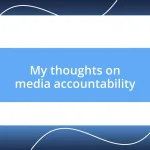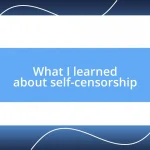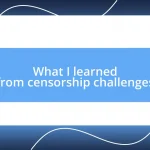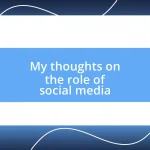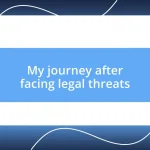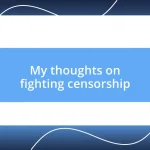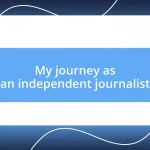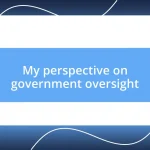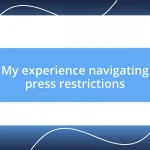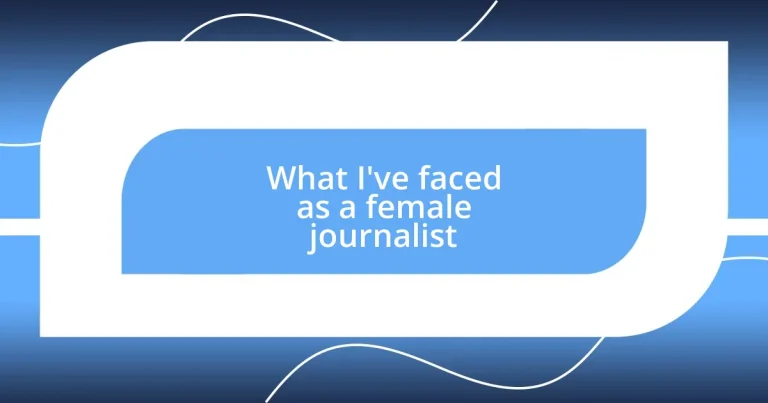Key takeaways:
- Gender bias in journalism leads to female journalists’ ideas being dismissed until echoed by male colleagues, affecting recognition and respect.
- Establishing a strong support network among female journalists is crucial for empowerment and navigating industry challenges.
- Overcoming workplace discrimination requires persistence in asserting oneself and seeking mentorship for guidance and opportunities.
- Achieving personal milestones, such as publishing impactful stories or mentoring others, reinforces the value of women’s contributions in journalism.
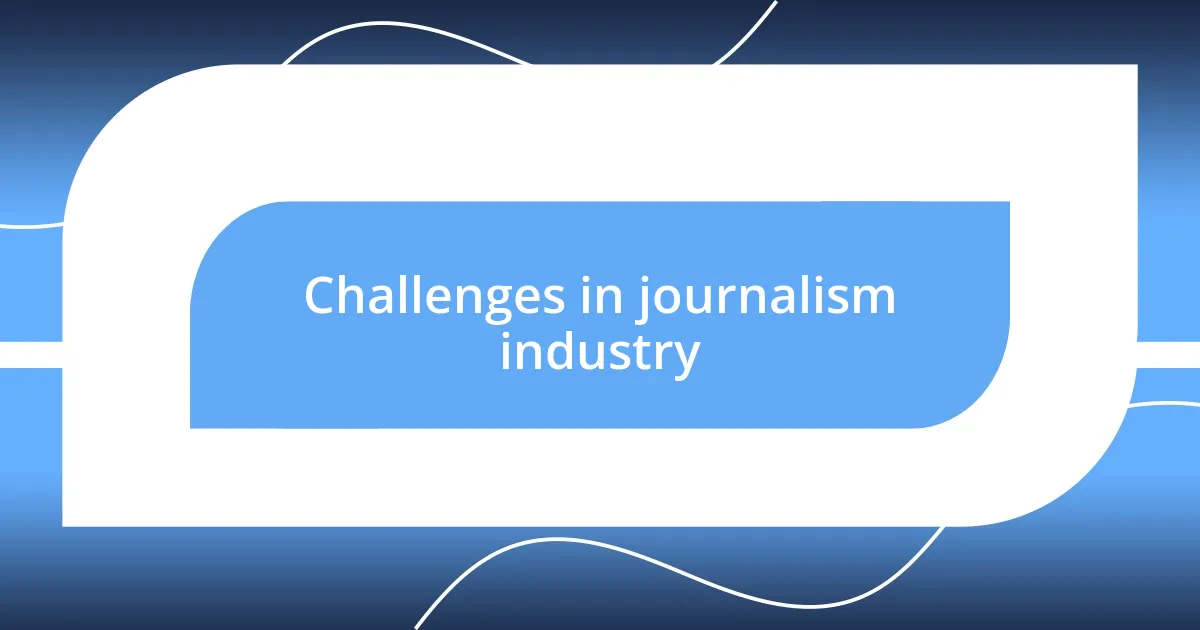
Challenges in journalism industry
One of the most pressing challenges I’ve faced in the journalism industry is the pervasive issue of gender bias. I’ve frequently experienced moments where my ideas were dismissed, only for them to be embraced when voiced by a male colleague. Has anyone else felt that sharp sting of frustration? It’s disheartening, and at times, it really makes you question your worth and contributions.
In addition to gender bias, there’s the constant struggle with work-life balance. There were days I took calls at odd hours, juggling deadlines while trying to maintain a life outside of reporting. I remember once covering a major event and missing a family gathering, only to feel the weight of both my commitments—my professional responsibilities pulling me one way and personal relationships the other. How do you prioritize when both sides demand your attention?
Another significant hurdle is the safety issue. On multiple occasions, I found myself in situations that felt precarious while chasing a story. I recall a time when I reported on a protest where tensions escalated. The reality of being a female journalist in such environments can be daunting—it’s not just about gathering information; it’s about securing your safety while doing so. How do we navigate this balancing act? It’s a question that often lingers in my mind, reminding me of the delicate nature of our profession.
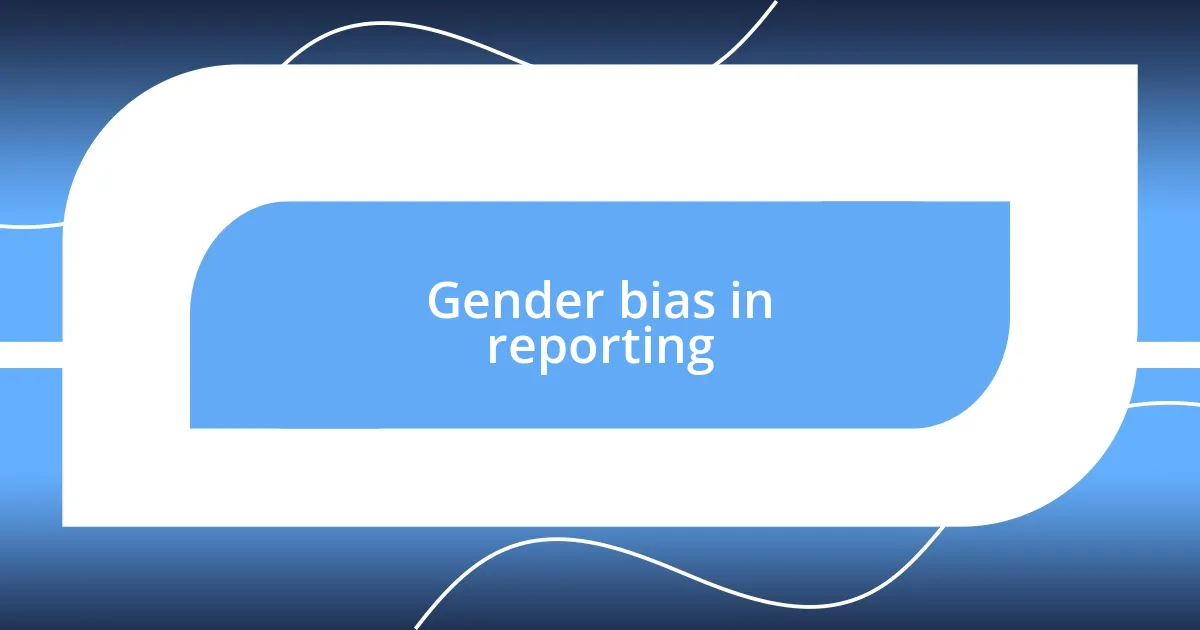
Gender bias in reporting
I’ve noticed that gender bias in reporting often manifests in the subtle ways my contributions are overlooked. For instance, during a brainstorming session, I proposed an angle for a feature story, only to see it brushed aside. Later, when a male colleague introduced a similar idea, it was met with enthusiasm. I felt a mix of disbelief and frustration—why does it take a male voice for certain ideas to be valued? This experience is not just about the story; it’s about recognition and respect in a field where we all strive for equality.
To paint a clearer picture, here are some common manifestations of gender bias in reporting:
- Idea Dismissal: Female journalists often feel their suggestions are undervalued until articulated by male counterparts.
- Interview Dynamics: I’ve experienced being interrupted frequently during interviews, which seemed to happen less with my male colleagues.
- Coverage Decisions: Female journalists might be assigned to cover topics deemed “feminine,” like health or lifestyle, while men tackle hard news or sports.
- Leadership Opportunities: It’s disheartening to see male colleagues promoted to leadership positions over equally or more qualified women.
- Public Perception: There’s a prevailing stereotype that can label female journalists as overly emotional or biased, which can undermine their credibility.
Each instance not only affects individual careers but also shapes the narrative landscape we operate within.
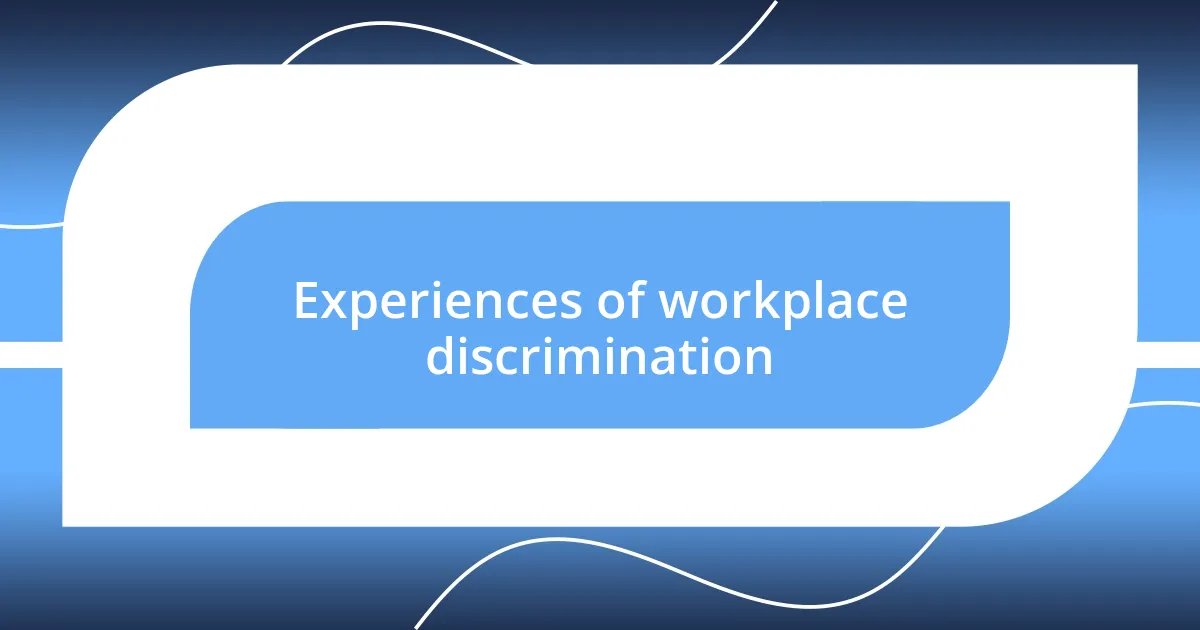
Experiences of workplace discrimination
Experiences of workplace discrimination in journalism often come down to the subtle yet impactful moments that chip away at our confidence. I remember attending a press conference where, after I asked a complex question, the panel made a joke about “keeping it simple for the ladies.” That moment stung; it felt like a condemnation of my competence purely based on my gender. It’s those sorts of experiences that can make me doubt whether I truly belong in this field, despite my qualifications and hard work.
The pressure to prove myself is ever-present. Once, while working on a high-stakes investigative piece, I was met with skepticism from a source who assumed I didn’t have the knowledge to handle intricate details. When my male colleague stepped in, the entire dynamic shifted. Suddenly, they were eager to share information. It’s situations like these that lead to feelings of isolation and the relentless yearning for validation. Why should I have to consistently validate my credibility in this profession?
Ultimately, the challenge of workplace discrimination isn’t just about personal feelings—it’s about the broader implications for journalism as a whole. I reflect on a female colleague who was passed over for a major story because the editor thought her perspectives would be “too soft.” This is indicative of a larger issue, where competent women are sidelined simply because they don’t fit stereotypical notions of what a journalist should be. Each story we tell or miss out on carries weight and reflects on the industry, reminding us that there is still a long way to go for equality.
| Type of Discrimination | Experience |
|---|---|
| Idea Dismissal | Having my angles ignored until a male colleague presents them. |
| Interruptions | Being cut off more frequently during interviews compared to my male coworkers. |
| Assignment Bias | Being assigned to “soft” stories while men get hard news or investigative pieces. |
| Promotion Disparity | Seeing male colleagues promoted despite my qualifications being equivalent or superior. |
| Stereotyping | Facing biases that label female journalists as overly emotional, impacting credibility. |
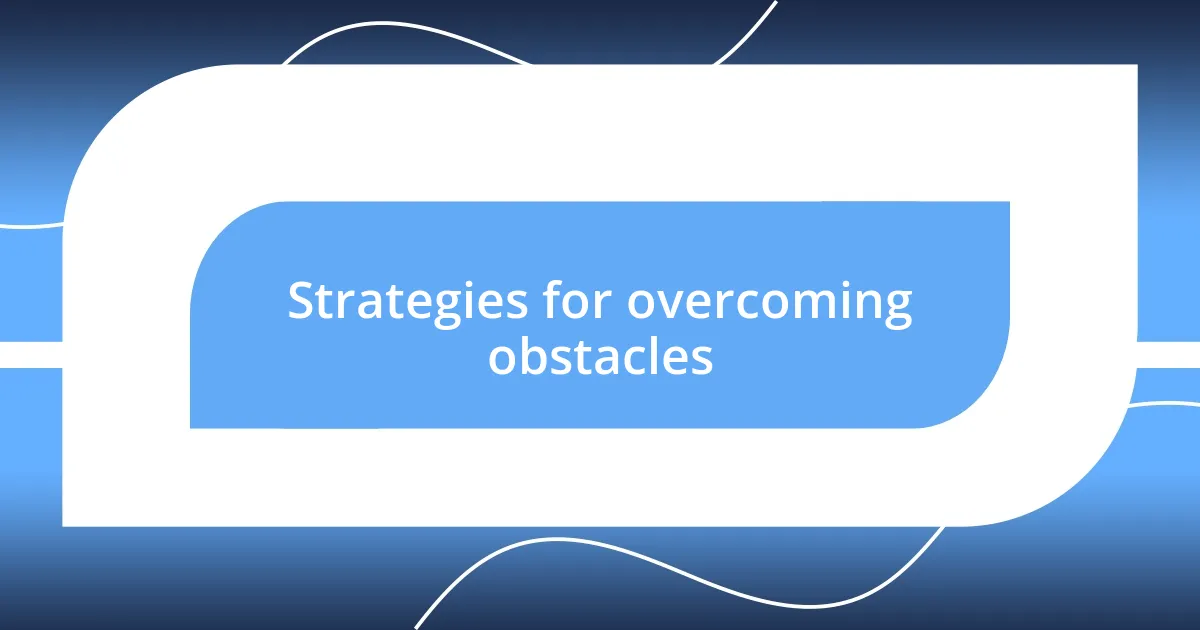
Strategies for overcoming obstacles
When it comes to overcoming obstacles in journalism, I’ve found that building a strong support network is essential. Surrounding myself with fellow female journalists has made a huge difference in navigating the challenges we face. Sharing experiences and advice not only empowers us but also fosters a sense of solidarity—like having a sisterhood in this often tough industry. Have you ever leaned on friends in a professional setting during challenging times? It’s a game changer.
I also learned the importance of asserting myself in discussions and decision-making processes. Speaking up can feel daunting, especially when it seems my ideas have been dismissed in the past. However, I’ve made it a point to reiterate my contributions confidently, reinforcing their value. I find that my persistence often leads to a shift in dynamics; suddenly, my ideas gain traction, and it’s a satisfying feeling to watch the tide turn. Why should I hold back when I know my insights are valid?
Additionally, seeking mentorship has proven incredibly valuable for me. I remember reaching out to a well-respected female editor in my area. Her advice was invaluable, helping me navigate office politics and encouraging me to pursue the more challenging assignments that often felt out of reach. Learning from someone who has walked a similar path can illuminate the way forward. If you don’t have a mentor yet, I strongly encourage you to find one; the perspective they provide is something you can’t replicate on your own.
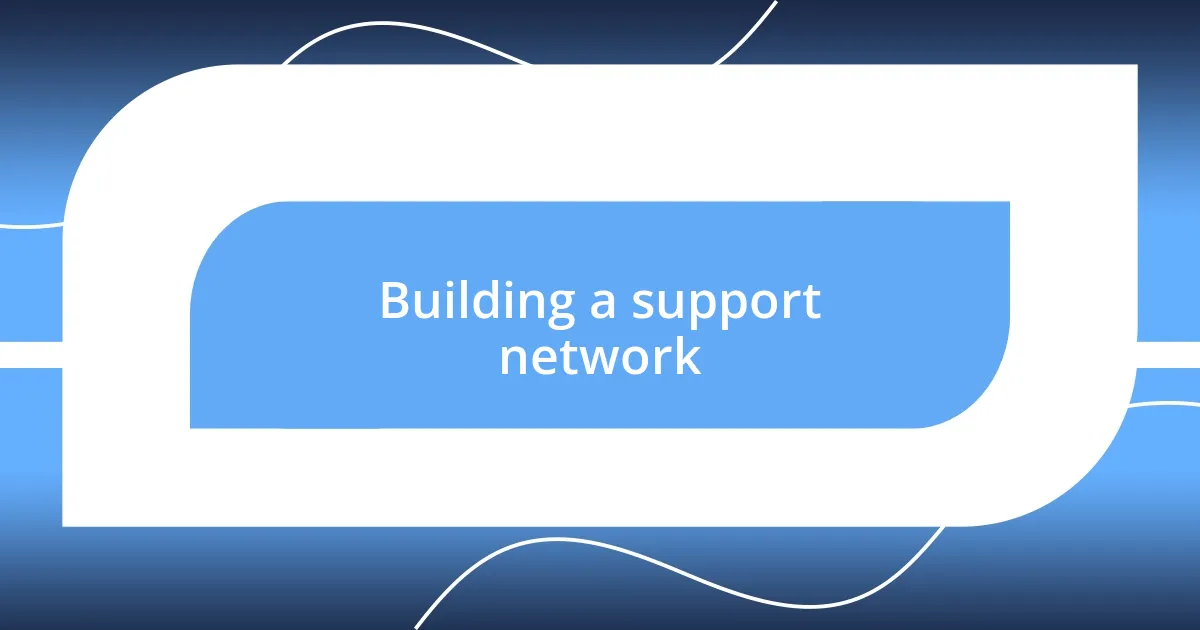
Building a support network
Building a solid support network has been a cornerstone of my journey as a female journalist. I vividly recall the first time I attended a women’s journalism event; it was like walking into a room where everyone understood the unique struggles I faced. We shared stories that resonated deeply, igniting a sense of belonging I’d never felt in a male-dominated environment. Have you ever experienced that feeling of connection with someone who just gets it? It’s incredibly powerful.
In my experience, mentoring relationships have blossomed within these networks. One time, a fellow journalist took me aside during a conference to share her own challenges with bias. Her candidness gave me the courage to voice my own concerns about the issues I’d faced, and we brainstormed ways to tackle them together. This not only built our camaraderie but also solidified a commitment to uplift and support each other. It’s incredible how a little vulnerability can create space for teamwork and mutual encouragement, isn’t it?
Moreover, access to diverse perspectives within my network has broadened my understanding of the industry. During one of our regular meet-ups, I listened to a friend recount her ambitious plan to cover underreported stories in her community. It inspired me to rethink my own assignment choices and push for stories that centered on marginalized voices. Engaging in these enriching conversations and learning from one another cultivates growth; it reminds me that our individual successes contribute to a collective elevation within our profession. Isn’t it heartening to know that when we rise together, we’re creating a more inclusive landscape for all?
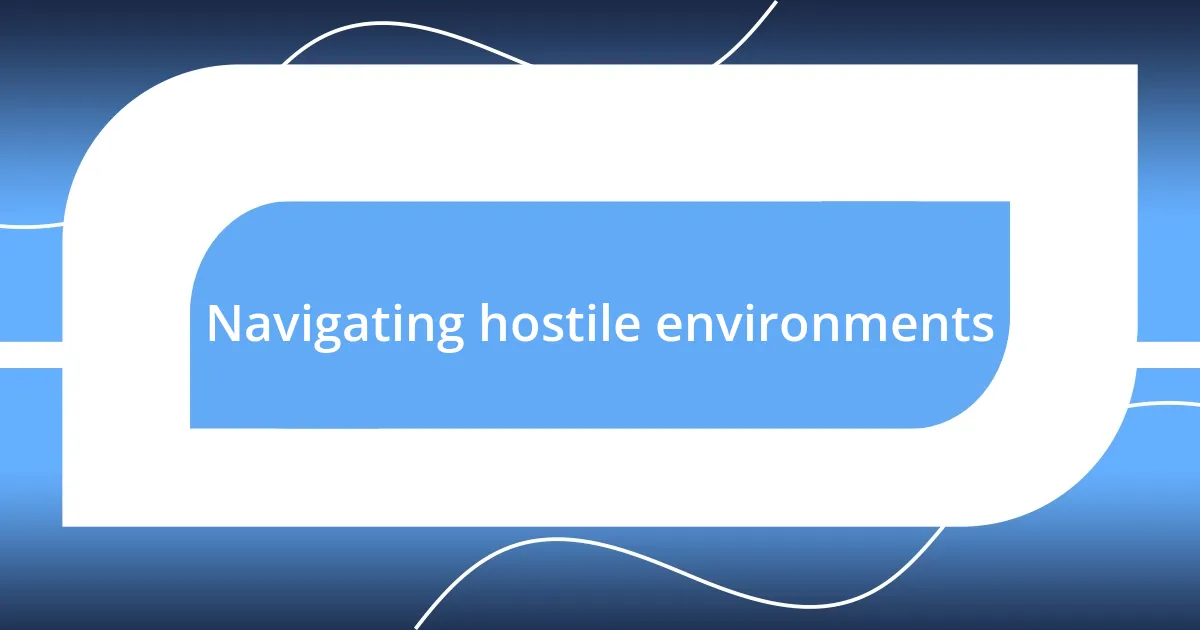
Navigating hostile environments
There have been moments when I found myself in truly hostile environments, particularly while covering protests or political upheaval. Once, I was reporting on a march that turned violent; the tension was palpable, and fellow journalists and I were targeted simply for being there. In that moment, I had to find a balance between getting the story and ensuring my safety. How do you stay grounded when the atmosphere feels charged and unpredictable? For me, it’s all about staying focused and remembering why I’m there in the first place—to tell the truth.
In navigating these situations, I’ve learned to trust my instincts. I recall a day when a group became aggressive, and my gut told me to step back rather than engage. It was tough to pull away from the action, especially when adrenaline was running high. But in that instance, prioritizing my safety paid off; retreating allowed me to reassess and gather my thoughts. Isn’t it fascinating how self-preservation can sometimes lead to better reporting? When I look back on such experiences, I realize how vital listening to that inner voice is in our line of work.
Moreover, I often remind myself that showing vulnerability doesn’t equate to weakness, especially in hostile environments. During an assignment in a volatile area, my camera was knocked from my hands. Instead of merely panicking, I took a moment to breathe and compose myself. I showed the locals my genuine concern and purpose, which helped me regain their trust while obtaining vital interviews. Isn’t it interesting how being human can create connections, even in chaotic circumstances? Embracing vulnerability instead of shying away from it can unexpectedly lead to deeper relationships and stories worth telling.
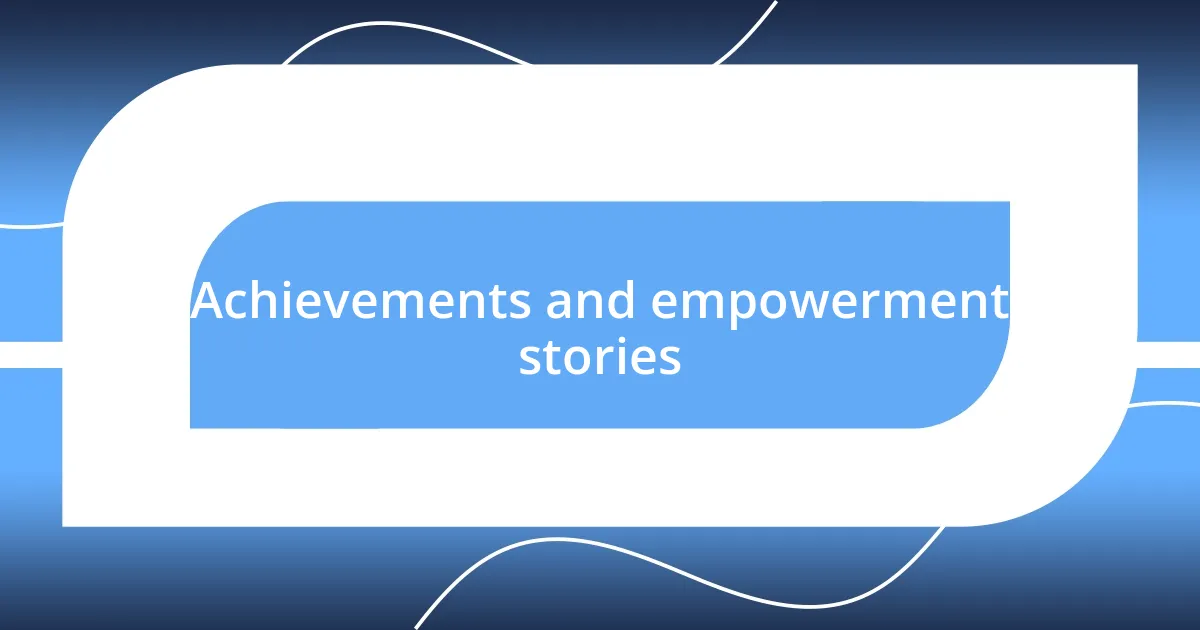
Achievements and empowerment stories
Throughout my career, I’ve celebrated several significant achievements that serve as reminders of the power of persistence. I remember the exhilarating moment when my first major investigative piece got published in a prominent magazine. The feedback was overwhelmingly positive, and it stood as a testament not just to my dedication, but to the potential of women in journalism. Have you ever felt that rush when your hard work pays off in a big way? For me, it reaffirmed my belief that our voices truly matter, and we have stories worth telling.
One empowering experience that stands out was when I organized a community workshop for aspiring female journalists. It was heartwarming to see the participants’ eyes light up as they shared their dreams and faced their fears. This was more than a workshop; it became a nurturing space where we could support each other. Have you ever seen someone light up with hope? Those moments reminded us that each of us has the ability to uplift another, reinforcing the idea that our triumphs are collective. It’s the little victories that create lasting change.
Another achievement that brought immense joy was when a young woman I mentored landed her first byline. She reached out to me in disbelief, expressing gratitude for the guidance I provided during those initial, uncertain days. Hearing her excitement made me reflect on the cyclical nature of empowerment—how raising others can elevate us all. Isn’t it invigorating to witness the impact of sharing knowledge? Every time I see someone step into their power, I’m reminded of the responsibility we have to lift each other up in this field.



